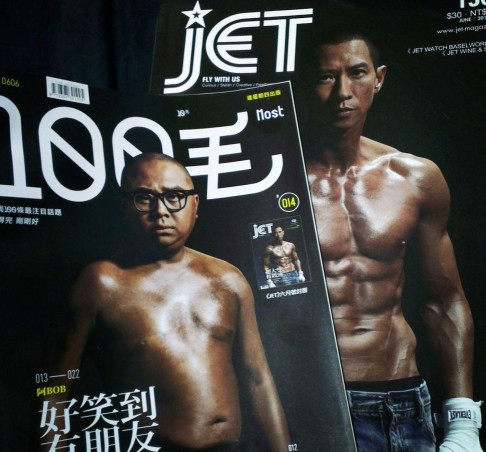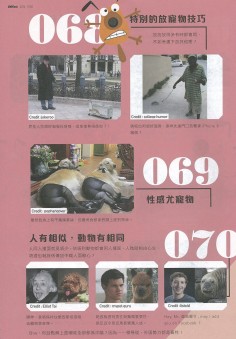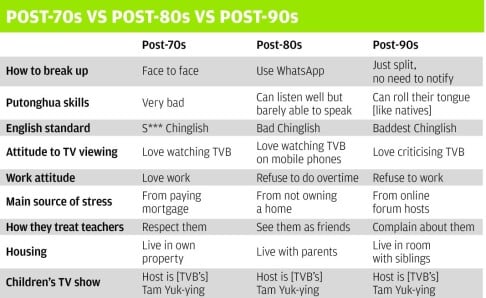
100Most - a satirical weekly that's a hit with Hong Kong's Occupy generation
At a time when publishers are battered by falling ad revenues and readers increasingly expect free content, the weekly is a marvel. It began in March 2013 and quickly gained popularity for its irreverence, acid humour and ability to tap into current youth culture.
Nearly two years after its launch, shifts about 80,000 copies each week and is already bringing in revenue for its three founders - Lam Yat-hei, Iu Kar-ho (popularly dubbed Ah Bu) and Luk Ka-chun (who goes by the pen name Chan Keung).
The trio, who are in their early 30s, became friends while at working at Commercial Radio, and initially went into publishing simply as a venture that could bring them together after Lam left to work for a sister company in 2008.

"It's kind of a silly reason, but the three of us joined Commercial Radio at around the same time in 2005, and found we shared similar values and outlook on life," Bu says.
The friends decided they would only meet regularly if there was a joint project to work on together. That decision yielded , an A5 size card filled on one side with their pithy political commentary and musings on life and art.
The friends each shelled out HK$2,000 to print the first 2,000 copies, which went on sale on New Year's Day, 2010. Priced at just HK$1, the cards sold out within two days. An additional print run of 20,000 copies was also quickly snapped up. By 2011, the monthly newsletter was being distributed at all 7-Elevens and sales rose to 100,000 copies.
Success soon inspired the trio to dream of a bigger platform to air their views: They quit their day jobs and started the magazine with HK$1 million accumulated from 's revenues. "We were fortunate to have a pool of money," Chan Keung says.
Both publications feature plenty of satire and humour. But while the monthly focuses on politics, is more about daily life and entertainment, Chan says.

They now operate from a first floor space in an industrial building in Kwai Fong, where the laid-back vibe resembles a cafe more than a newsroom. The team has also grown from the initial four - including the founders - to about 30 full-time staffers.
Their magazine, which costs HK$10, got its name because "the 100 topics we select [for each issue] are the hottest and most talked-about in town over the past week. However busy you are, as long as you take the time to read our magazine, you won't be out of touch," Bu says.
Covers often feature send-ups of celebrities. One had popular lyricist Albert Leung (better known by his pen name Lam Chik) dressed like student leader Joshua Wong Chi-fung at the Occupy protest site on Harcourt Road. Another issue saw chubby Metro Broadcast DJ Bob Lam bare his torso in a parody of actor Nick Cheung Ka-fai's topless magazine cover that had many talking.
Its contents include celebrity interviews, comics, material gleaned from the internet and covers subjects from food to fashion and film. The style is to deliver the text in short chunks with plenty of graphics - just how most young people like their reading material these days, Bu says.
The key to attracting young readers is to make it snappy and funny, he says. "Young people don't want long reads now."
Among the most popular features are its wry observations of Hong Kong life that often give succinct insights into festering social issues. Consider a chart titled "Post-70s vs Post-80s vs Post-90s" (see translated table), which struck a chord with readers, garnering tens of thousands of Facebook likes.
Chan says their team doesn't always create content from scratch, but they are good at discovering and compiling available material and reworking or analysing it to give a different perspective. "We rewrite online news and give it a humorous take. But we also send reporters to dig out interesting things like fashion and neighbourhood stories."
He adds: "We are a print magazine that works like an online publication. The local market is not as mature as Western ones. Overseas, it can be very lucrative to run an online publication. But Hong Kong is still quite conservative [with a large readership that prefers print]. It might be best to publish our stuff online. But we will fail if we do that, as no one will pay to read it."
But they have to keep up with the digital age, which is why they're working on a mobile app offering different content to the magazine.
, which clearly backed the Occupy movement, became required reading for many youngsters during the protests, and newspapers and phone-in programmes regularly turned to its three founders for comments as indicative of young people's thinking.
As Chan sees it, young Hongkongers are facing the best and worst of times.
"There was never so much hope for young people as during the Occupy movement. They are full of passion and act on their beliefs."
But they are also living in a society under growing pressure from the central government to tighten control on civic freedoms, Chan says. In the past, there was more room to manoeuvre "but nowadays ... if they don't object, Article 23 [anti-subversion] legislation and national education programmes will become reality".
Still, the founders take pains to say they do not claim to represent any generation.
"We would never think that represents young people," Lam says. "Young people abhor the power establishment; they do not believe anyone can represent them. Everyone has individual views on issues. Even though the three of us have a lot in common, we also have different views on many topics. How can a magazine represent a whole group of people? This is very wrong thinking."
Although their readers are mostly young people, Lam says age should not be a yardstick for gauging a publication's readership.
"We do not recommend to people with [ossified] thinking. Old people can be young at heart. But those young people who only like to speculate on the property market and are apathetic about politics are actually old at heart. Such people should not read our magazine."
We would never think that 100Most represents young people. They abhor the power establishment, they do not believe anyone can represent them
Offbeat content aside, also takes an unconventional approach to management. Staff can apply for sick leave through WhatsApp without producing a doctor's note. They are free to criticise the founders, browse Taobao, YouTube and even cook up a crab feast during office hours.
That's because they believe a less restrictive atmosphere can boost creativity at work, Bu says.
With two of the founders describing themselves as "losers" at school, it's perhaps not surprising gives little weight to paper qualifications in hiring.
"We ignore academic credentials when interviewing job candidates ... The most important thing is their personality. They have to be fun-loving and creative."
Bu, who failed Chinese in his public exams and pursued an associate degree in communications instead, got his break came when he won a DJ competition and joined Commercial Radio.
Exam results are no indication of someone's aptitude for working in the creative industry.
"When reviewing job candidates, I check their Facebook pages, their timeline, posts and status, and so on. This can reveal their approach to life. If someone posts amusing comments with a picture of the egg and ham noodles that he ate, I would be impressed."
While Chan Keung earned a degree in environmental science and management from City University, Lam says he was a lazy student and dropped out of a design course at the Institute of Vocational Education.
"I don't like studying, which is useless. It can't help me do what I want to do. Those who want to be architects or doctors need to study [to have specialist knowledge].
"But I wanted to be a lyricist, so I read novels to improve my Chinese language. School doesn't help me [achieve this goal]."
Lam joined Commercial Radio to help set up its online forum, but eventually realised his songwriting dream. He slipped some of his best lyrics to its deputy chairman Winnie Yu Tsang, who was impressed enough to transfer him to the creative department.
"The move changed my career," Lam says - he has since penned lyrics for more than 100 songs.
Although sales and advertising are on the rise at , Chan says they aren't taking anything for granted; they feel thankful rather than elated.
"We don't feel proud or anything. We are just happy that the magazine didn't die. When we left Commercial Radio, an established institution, our only goal was to survive.
"We also realise the publishing industry goes through ups and downs. magazine used to dominate [the youth market], but it eventually folded. And after came out, people were less interested in . Will people later forget too? I think that's only natural."


